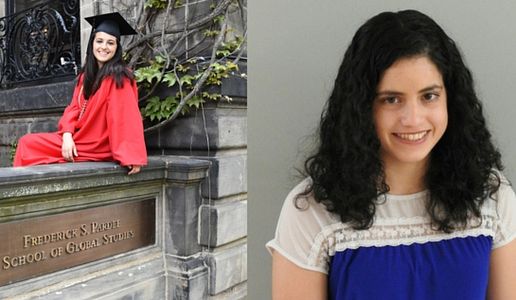Alumni Spotlight: Gonzalez, Abou-Raad Publish OpEds

Students taking the Forced Migration and Human Trafficking (IR 500) course at the Frederick S. Pardee School of Global Studies during the Spring 2016 semester had the opportunity to turn a class assignment into a published article for a major news outlet.
Noora Lori, Assistant Professor of International Relations at the Frederick S. Pardee School of Global Studies, teaches IR 500 asked her students to write Op-Eds for class assignments. Two of those students turned their assignments into Op-Eds that were published by the Huffington Post.
“Assigning op-eds was part of a larger philosophy of taking the Pardee School’s mission seriously– how do can we not only do research but also teach in a way that can have a policy impact? How can we engage students and siphon their creativity and energy towards thinking about policy solutions, however minuscule, to large-scale real-life problems,” Lori said. “I thought the op-eds would also excite students because their assignment wouldn’t only be read by me; they would have the opportunity to reach a broader audience. These op-eds were designed to speak to the students’ own peers—not to me.”
Sara Mejias Gonzalez (Pardee ’16) and
Gonzalez’s Op-Ed, entitled “Local Matters: What to do During the DAPA/DACA+ Stalemate,” focuses on what can be done at the local level to help undocumented immigrants integrate into the United States culture and society.
“Since a lot of attention has been going to the Supreme Court case United States vs. Texas, I wanted people to remember that it wasn’t just federal laws or President Obama’s executive action that affect the lives of migrants, but that state laws also have an important part to play,” Gonzalez said. “Most importantly, since immigration is such a heated topic right now, I wanted to give people ideas about how they could help migrants in their community even during a time where there is a lot of racism and fear towards immigrants.”
Abou-Raad said her Op-Ed, “5 Things I Learned From Syrian Refugees In Jordan,” was inspired by a trip she took to Jordan to interview refugee women and humanitarian aid providers for her Honors Thesis.
“I knew that I wanted to do more than write a thesis about my experiences in Jordan because sharing the stories of the individuals I met was one of the only ways that I could use my own skills to assist them,” Abou-Raad said. “For this reason, my Op-Ed aims to dispel a lot of the misconceptions and hateful rhetoric that has been directed at refugees in order to create a more welcoming and accepting culture.”
Gonzalez said the assignment, coupled with Lori’s guidance, presented students with the opportunity to write on a topic they are passionate about.
“It was really helpful that Professor Lori gave our class the freedom to write about anything that related to forced migration and human trafficking for our op-ed assignment, which gave everyone the motivation to write about a topic that they really cared about,” Gonzalez said. “Professor Lori also gave me great feedback during my thesis defense on how I could expand on the power that states have to improve the lives of migrants, so she really helped me take the research that I had already done to the next level. By the time that I started writing the op-ed, I was already strongly aware about what I wanted to express.”
Lori said the Op-Ed assignment was aimed at helping recent graduates get used to the publication process as well as allowing them to enter the job market having already been published.
“It is critical for our students and recent graduates to have published articles because it allows them to enter the job market with an online presence that reflects their work instead of only their social lives,” Lori said. “It helps them succinctly show their research and writing skills to potential employers and most importantly, I think it demystifies the publication process and helps instill a love for writing and being publicly engaged with a larger conversation.”
Both Gonzalez and Abou-Raad said writing an Op-Ed was a challenge after extensively researching and writing an academic piece like a thesis, but that seeing their Op-Eds published by a major outlet such as the Huffington Post has encouraged them to pursue similar opportunities in the future.
“Writing for a public audience is very different than writing a thesis or academic paper,” Abou-Raad said. “After having been engulfed in a thesis for a whole year, I really had to work hard to make my article interesting and appealing to a large audience. This process has made me a better writer because it has helped me to really think about who my audience is and what I want to convey to them.”